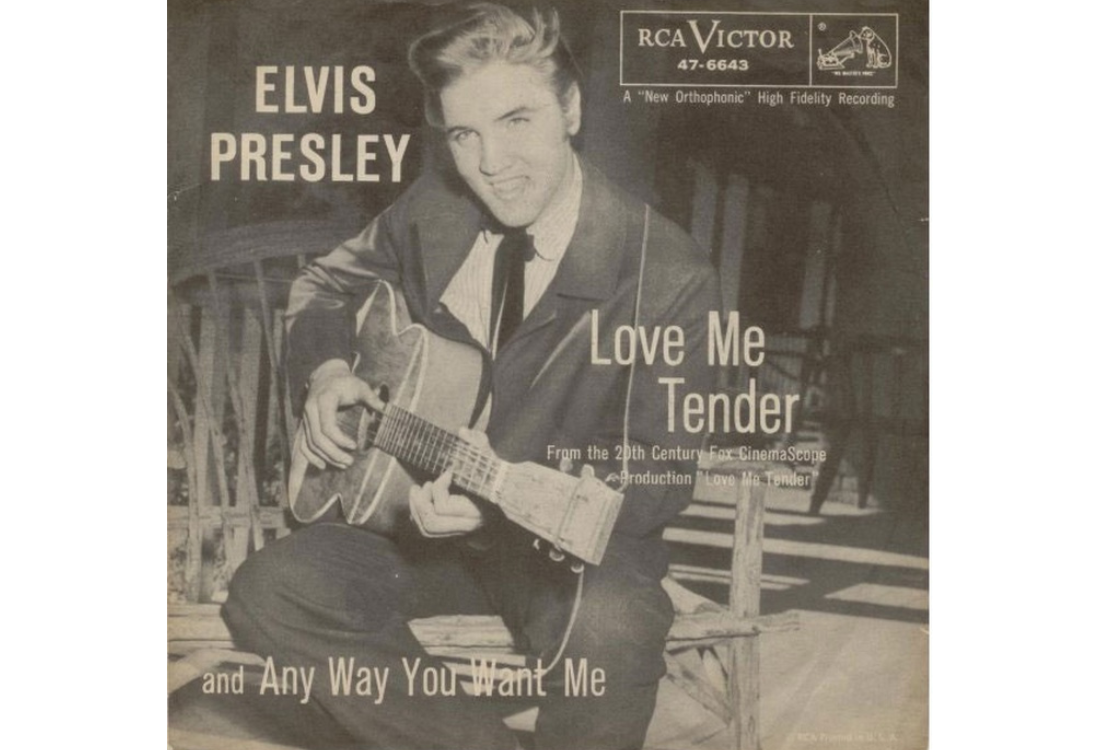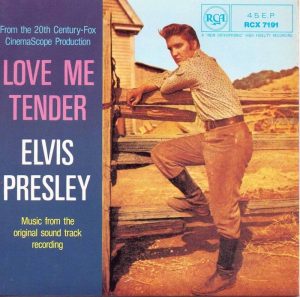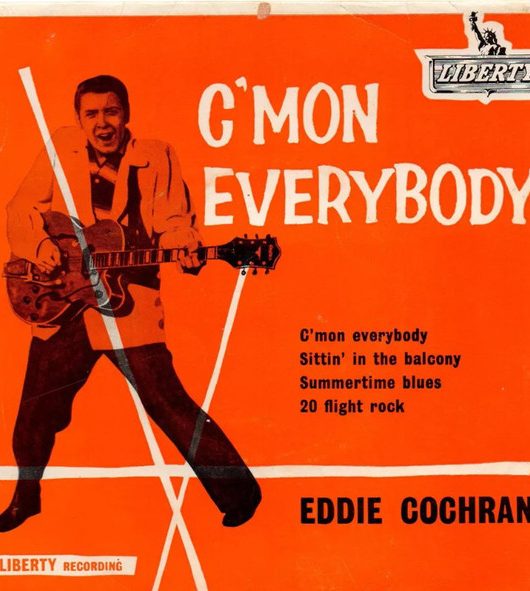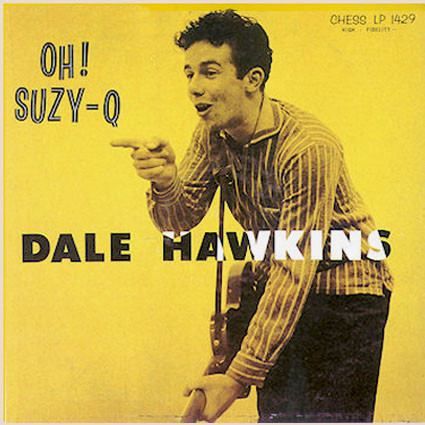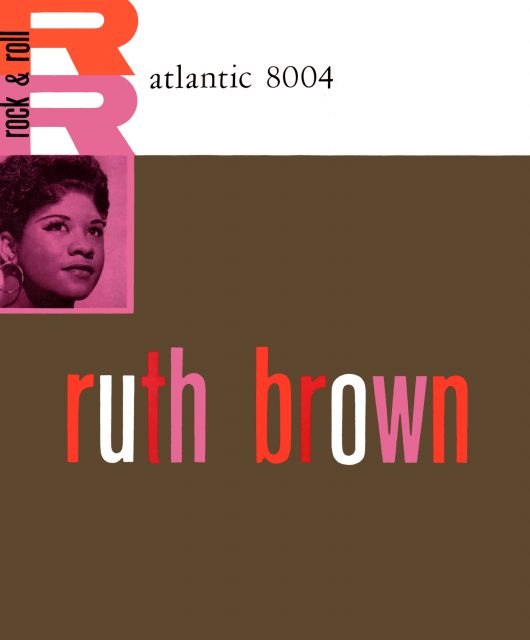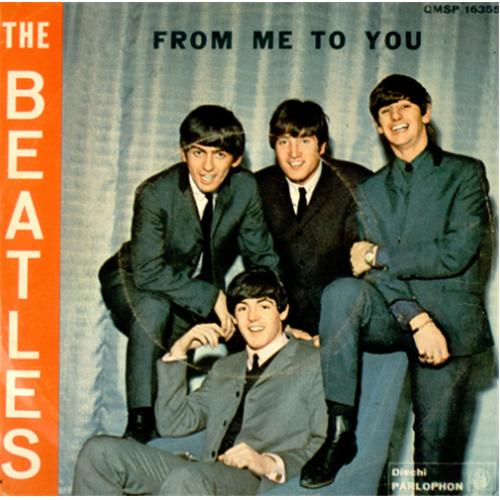Love Me Tender was the Hollywood western that launched Elvis’ acting career and, featuring his No.1 smash, was one of his best-loved turns in front of the cameras… Words by Douglas McPherson
Two weeks before Elvis Presley topped the chart for the first time with Heartbreak Hotel in the spring of ’56, he signed a movie contract with Hal Wallis, producer of screen classics Casablanca and The Maltese Falcon. When Wallis couldn’t find a suitable picture for the singer, Elvis was loaned to 20th Century Fox to make his acting debut in a western then called ‘The Reno Brothers’.
Befitting his newcomer status, the rock’n’roller was given third billing, beneath Richard Egan and Debra Paget, and listed on the credits as ‘Introducing Elvis Presley’. By the time filming began in late August, however, Presley’s stardom far exceeded Fox’s expectations. When advance orders for Love Me Tender, a song from the film, topped a record-breaking million copies, the movie was renamed after the song. Although Egan retained top billing, Presley’s image dominated the posters and a 40-foot cut-out of the singer towered over the Paramount Theatre when the movie premiered in New York on 15 November 1956.
Lighting Up The Big Screen
Shot in black and white, Love Me Tender is a gritty western with strong action scenes and a gripping romantic love triangle that’s at its heart.
Tightly scripted by Robert Buckner, based on a story by Maurice Geraghty, the movie begins in 1865, with a group of Union soldiers learning that the American Civil War is over. Unfortunately, news hasn’t reached a Confederate raiding party led by Vance Reno (Egan), and his younger brothers, Ray and Brett. The Rebels capture the Union troops and take their uniforms, which they use to rob a train and steal a Union payroll.
When they discover the Confederacy has been defeated, the Rebels divide the money among themselves as spoils of war. The Renos return to their family ranch where Vance plans to marry his sweetheart Cathy (Debra Paget), only to find that, believing her true love was killed in action, she has married Elvis – or rather, we mean she married Vance’s youngest brother, Clint, who is played by Elvis.
Vance is heartbroken, but because he wants Cathy to be happy, and because he loves his kid brother too, he elects to leave town. Before he goes, government troops arrive in search of the stolen money and the family is thrown into a conflict that threatens to tear it apart.
The role of Clint Reno was turned down as too small by Robert Wagner and Jeffrey Hunter (who went on to play Captain Christopher Pike, the first captain of the starship Enterprise in the original pilot episode for Star Trek). But although it is 20 minutes into the picture before Clint appears, unglamorously steering a mule-drawn plough, Presley lights up the big screen in a role expanded to accommodate his stardom.
Elvis’ on-screen chemistry with Paget came from a real-life attraction. After the shoot, she claimed he asked her to marry him. Her parents objected and although she “cared about” her co-star, she went along with them. Elvis was “a precious, humble, lovely person,” Paget said. “He could have been a fine actor.”
Presley also played well off Egan. The seasoned Egan looks more like a father figure than an older brother, but that suits their characters as a stoic war veteran and a desperate-to-prove-himself boy who was too young to fight.
Shoehorned Songs
Presley didn’t want to sing in his first big screen appearance; he yearned to become a serious actor. There was no way, however, that 20th Century Fox was going to put the nation’s hottest singing sensation on screen and not have him sing – his music was the whole point of his appeal. Presley’s manager Colonel Parker and his record company RCA, meanwhile, were not going to miss the opportunity to promote Presley’s music through the medium of film.
Love Me Tender isn’t a musical, and the four numbers Presley sings were clearly shoehorned into a storyline that would have worked perfectly well without them. They are neatly accommodated, however, and do not pull us out of the story.
The title song and the gospel number We’re Gonna Move, are performed on the family’s porch on the evening of the brothers’ homecoming, which is a logical juncture for the youngest member of the clan to take out his guitar and sing to his kin. Presley’s wistful crooning of Love Me Tender actually heightens the drama. While Clint is singing to his wife, the camera pans away to Vance’s face as he reflects on the terrible love triangle he has found himself in.
When the broken-hearted Vance stands and walks away, our sympathies are with him, not Clint, making it probably the first and only time that Presley has been upstaged while he was singing!
All My Dreams Fulfill
There couldn’t have been a more appropriate song for Elvis to sing in a Civil War-era film than Love Me Tender, because the melody was borrowed from a ballad called Aura Lea that was published in 1861 and popular throughout the conflict.
With music by George R. Poulton and lyrics by W.W. Fosdick, the original chorus went:
Aura Lea, Aura Lea,
Maid with golden hair;
Sunshine came along with thee,
And swallows in the air.
Popular with minstrel shows and barbershop quartets, Aura Lea made its screen debut, sung by Frances Farmer, in the 1936 film Come And Get It.
Musical director Ken Darby rewrote the song as Love Me Tender for Elvis’ movie debut, although the writers were credited as Presley and Darby’s wife, Vera Matson (“Because she didn’t write it, either,” as Darby quipped). The Ken Darby Trio provided the music.
On 9 September 1956, Elvis sang Love Me Tender on the Ed Sullivan Show and generated a million advance orders – the first single ever to do so. It entered the chart at No.2 and hit the top spot on 3 November, ahead of the film’s release, and remained there for five weeks.
The other two songs from the film, Let Me and Poor Boy, are performed on an open-air stage at a local fair to raise money for a new school. Again, it’s a logical point for Clint to get up and do a turn. Presley’s leg-shaking and guitar swinging, and the screams of the girls in front of the stage, are more 1950s than 1860s, but at least the staidly-seated band are playing period-appropriate acoustic instruments.
Rebel Without A Cause
Presley’s pompadour, incidentally, is not a complete anachronism. Civil War soldiers wore their hair long and slicked back with pomade. The gunslinger look, meanwhile, had an influence on 50s fashion. The second-youngest Reno, Brett (William Campbell), spends the latter half of the movie in a long jacket, waistcoat and ribbon tie looking exactly like a British Teddy Boy!
Interestingly, although Presley is his usual loveable self in the musical scenes, he doesn’t play a likeable character. Clint starts off as childish and hero-worshipping, and becomes petulant, jealous and paranoid. He’s violent to his distrusted wife, develops a murderous hatred of his brother and by the final reel is pretty much the villain, even if he is ultimately reconciled with Vance in his death scene.
The idea was clearly to cast Presley in the kind of mixed-up misunderstood teenager role patented by James Dean in the previous year’s Rebel Without A Cause. His immature behaviour comes over as weak, however, in contrast to the heroic qualities of Egan’s Vance: strong, decent, self-sacrificing and, most of all, always in calm, steely control of himself.
The hot-headed Clint’s death is fitting. The most shocking moment is when Vance takes a bullet. Vance’s death would have given the film a truly tragic end. So it’s a relief when he survives, free to be with Cathy after the credits roll.
Silver Screen Success
Presley was reluctant to play a character who died but was persuaded by his girlfriend June Juanico that tragic characters were the most memorable.
Test audiences nevertheless objected to Elvis’ death in the picture. An alternative ending was considered in which Clint survives. In the end, a compromise was reached. Clint dies but a ghostly image of Presley singing Love Me Tender is superimposed over the final scene of his family walking away from his gravestone. The plot’s integrity was preserved and Presley still got to end the movie with a song, which was the perfect way to send his fans home on a high.
Presley’s on-screen demise still made his mother cry, however, and the singer vowed never to make another film in which his character died.
The critics hated the movie, probably as part of a wider establishment backlash against the rabble-rousing Presley. Time magazine said he had the screen presence of a sausage. But while Variety claimed he was no actor, it added, “Not that it makes much difference. The presence of Presley apparently is enough to satisfy the juve set.”
Female cinemagoers screamed as if they were watching a live concert instead of a movie and with the title song topping the chart, Love Me Tender recouped its costs within just three days.
The success meant Presley’s movie career was set to ‘Go’.
Read More: Elvis’ Silver Screen Songsmiths

